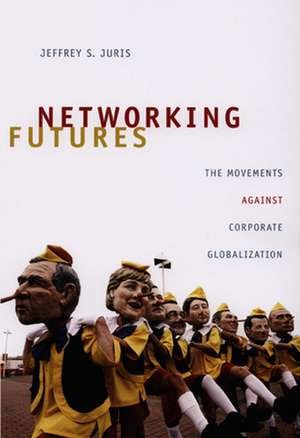Networking Futures – The Movements against Corporate Globalization: Experimental Futures
Autor Jeffrey S. Jurisen Limba Engleză Paperback – 8 iul 2008
Din seria Experimental Futures
-
 Preț: 194.18 lei
Preț: 194.18 lei -
 Preț: 173.62 lei
Preț: 173.62 lei -
 Preț: 260.69 lei
Preț: 260.69 lei -
 Preț: 174.22 lei
Preț: 174.22 lei -
 Preț: 239.64 lei
Preț: 239.64 lei -
 Preț: 218.52 lei
Preț: 218.52 lei -
 Preț: 174.27 lei
Preț: 174.27 lei -
 Preț: 192.74 lei
Preț: 192.74 lei - 23%
 Preț: 567.41 lei
Preț: 567.41 lei -
 Preț: 173.99 lei
Preț: 173.99 lei -
 Preț: 193.98 lei
Preț: 193.98 lei -
 Preț: 193.44 lei
Preț: 193.44 lei -
 Preț: 215.05 lei
Preț: 215.05 lei -
 Preț: 193.27 lei
Preț: 193.27 lei -
 Preț: 252.13 lei
Preț: 252.13 lei -
 Preț: 201.63 lei
Preț: 201.63 lei -
 Preț: 166.55 lei
Preț: 166.55 lei -
 Preț: 219.61 lei
Preț: 219.61 lei -
 Preț: 242.06 lei
Preț: 242.06 lei -
 Preț: 175.65 lei
Preț: 175.65 lei -
 Preț: 175.69 lei
Preț: 175.69 lei -
 Preț: 215.66 lei
Preț: 215.66 lei -
 Preț: 264.26 lei
Preț: 264.26 lei -
 Preț: 261.38 lei
Preț: 261.38 lei -
 Preț: 306.99 lei
Preț: 306.99 lei -
 Preț: 239.38 lei
Preț: 239.38 lei -
 Preț: 259.42 lei
Preț: 259.42 lei -
 Preț: 306.00 lei
Preț: 306.00 lei -
 Preț: 214.21 lei
Preț: 214.21 lei -
 Preț: 301.97 lei
Preț: 301.97 lei -
 Preț: 220.64 lei
Preț: 220.64 lei -
 Preț: 261.18 lei
Preț: 261.18 lei -
 Preț: 266.18 lei
Preț: 266.18 lei -
 Preț: 304.10 lei
Preț: 304.10 lei -
 Preț: 260.41 lei
Preț: 260.41 lei -
 Preț: 261.38 lei
Preț: 261.38 lei - 23%
 Preț: 886.19 lei
Preț: 886.19 lei
Preț: 137.50 lei
Nou
Puncte Express: 206
Preț estimativ în valută:
26.31€ • 27.37$ • 21.72£
26.31€ • 27.37$ • 21.72£
Carte disponibilă
Livrare economică 25 martie-08 aprilie
Livrare express 08-14 martie pentru 34.49 lei
Preluare comenzi: 021 569.72.76
Specificații
ISBN-13: 9780822342694
ISBN-10: 0822342693
Pagini: 400
Ilustrații: 29 illustrations, 8 tables
Dimensiuni: 179 x 236 x 26 mm
Greutate: 0.56 kg
Editura: MD – Duke University Press
Seria Experimental Futures
ISBN-10: 0822342693
Pagini: 400
Ilustrații: 29 illustrations, 8 tables
Dimensiuni: 179 x 236 x 26 mm
Greutate: 0.56 kg
Editura: MD – Duke University Press
Seria Experimental Futures
Cuprins
Introduction: The Cultural Logic of Networking; 1 The Seattle Effect; 2 Anti-Corporate Globalization Soldiers in Barcelona; 3 Grassroots Mobilization and Shifting Alliances; 4 Performing Networks at Direct Action Protests; 5 Spaces of Terror: Violence and Repression in Genoa; 6 May the Resistance be as Transnational as Capital!; 7 Social Forums and the Cultural Politics of Autonomous Space; 8 The Rise of Informational Utopics; Conclusion: Political Change and Cultural Transformation in a Digital Age
Recenzii
Networking Futures is a terrific, deeply informed ethnographic account of the origins and activities of the anti-corporate globalization movement. Jeffrey S. Juriss identity is as much that of an activist who happens to be doing first-rate anthropology as vice versa, and there is much for anthropologists to reflect on in the way that this work is set up and narrated through these dual identities. George Marcus, University of California, IrvineNetworking Futures is one of the very first books to map in detail the multiple networks that are challenging corporate globalization. Taking as a point of departure an exemplary casethe Catalan antiglobalization movements of the past decadeJeffrey S. Juris moves on to chronicle the collective struggles to construct not only an alternative vision of possible worlds but the means to bring them about. Networking Futures is a compelling portrait of the spirit of innovation that lies behind an array of progressive mobilizations, from anarchist movements and street protests to the World Social Forum. Based on a well-developed notion of collaborative ethnography, it is also a wonderful example of engaged scholarship: a much-needed alternative to academic work as usual.Arturo Escobar, author of Territories of Difference: Place, Movements, Life, RedesJeffrey S. Juris gives us an illuminating model for how to study networks from below using the tools of ethnography. And in the process he reveals the extraordinary power (as well as the challenges) of network organizing for social movements today.Michael Hardt, co-author of Empire and MultitudeNetworking Futures is a terrific, deeply informed ethnographic account of the origins and activities of the anticorporate globalization movement. Jeffrey S. Juriss identity is as much that of an activist who happens to be doing first-rate anthropology as vice versa, and there is much for anthropologists to reflect on in the way that this work is set up and narrated through these dual identities.George E. Marcus, co-author of Designs for an Anthropology of the Contemporary
Notă biografică
Textul de pe ultima copertă
"Jeffrey S. Juris gives us an illuminating model for how to study networks from below using the tools of ethnography. And in the process he reveals the extraordinary power (as well as the challenges) of network organizing for social movements today."--Michael Hardt, co-author of "Empire" and "Multitude"
Descriere
Account of how the anti-corporate globalization movement uses new technologies to organize, written by a participant in many of the biggest demonstrations of recent years
